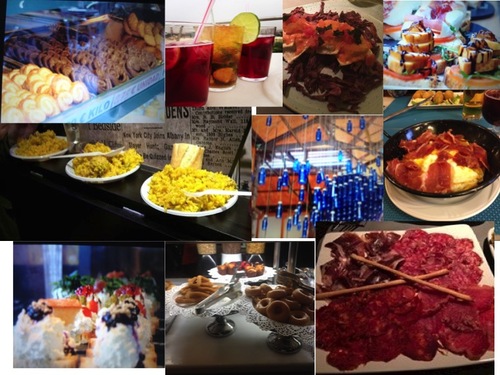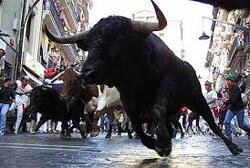-
Par AgatheCo le 15 Juin 2015 à 19:48
Here is the end of my semester in Madrid. I spent wonderful months in Madrid, I have learned so many things. I am more independent, more self-confident, and I have learned to be more open-minded.
During this semester I met people who made me grow up. I visited incredible places, I discovered Lisbonne for example for exemp. And I also had the opportunity to welcome my family in Madrid, and spent an amazing week with them.
But if I have the opportunity to go abroad again, I would like to go farther away, in the United State, or in Asia. I discovered a lot about culture, and differences in Madrid, and that made me want to discover more about the world and about more different countries.
 votre commentaire
votre commentaire
-
Par AgatheCo le 14 Juin 2015 à 18:55
For my free subject I have choose to talk about food in Spain, because I saw during my semester they didn't eat the same things than us.
But I think that the best way to talk to you about food is to show you pictures. So I made a compilation of pictures that I took during my semester.

So as you can see ham is very present in Spanish food. Just like churros or doughnut that Spanish people can eat at any time of the day, and paella that is a speciality of the country.
I also put a picture of Sangria and Mojito which are also specialities of the country.
 1 commentaire
1 commentaire
-
Par AgatheCo le 14 Juin 2015 à 17:42
Spain is made of several regions. That led to the creation of a lot of national celebrating days. There are the National Days, and also the Autonomous Communities days.
So there are the national ones :
- · Año Nuevo
- · Día de Reyes / Epifanía del Señor
- · Jueves Santo
- · Viernes Santo
- · Día del Trabajador
- · Asunción
- · Fiesta Nacional de España
- · Día de todos los Santos
- · Día de la Constitución
- · Inmaculada Concepción
- · Navidad
- · Sant Esteve
We can see that there is a lot of Catholic celebrations, because we know that Spain is a Catholic country, and that Spanish people are very religious.
And then, there are the celebrations in the Autonomous Communities. We have for exemple :
- · Dia de les Illes Balears 1 mars
- · Día de Andalucía 28 fevrier
- · Fiesta de la Comunidad de Madrid 2 mai
- · Día de las Canarias 30 mai
- · San José 19 Mars
During these celebrations we can find a lot of traditions. A battle of tomato for exemple in Brunol at the end of every summer, or a bull race in the streets of Pampelune during the San Fermín celebrations.
Everytime it is always huge celebrations and very impressive.
 Tomatina
Tomatina Bull race
Bull race CUSTOMS
Religion
Spain is known as a very reliogious country, and more precisely as a catholic country. 94% of the Spanish people said that they were catholic. But in reality they are more « catholic by culture ». They have been baptized, but they don’t go to church every Sunday, or don’t have a real faith. We can also find small comunities of muslims (1 million in Spain), Protestants, or Jews.
Rhythm of life
Spain has also a very specific rhythm of life. Their journey have two parts : the morning (8h – 13h), and the afternoon (16h – 20h). This rhythm is less marked in the big cities like Madrid, or Barcelone, but it is still very present in Spain. (You can find everything about this in my blog in the article « Rhythm of Life »)
Cooking
It is difficult to sum up all the culinary tradition in Spain, because of its huge diversity. But I am going to talk about « Tapas » that is one of the most important culinary tradition in Spain.
Some people say that originally, tapas were created by king to avoid alcoholism. The aim was to eat something with your glass of wine to be less alcohol effects. Then, some other people say that it has been created to avoid that flies fall in your glass of wine. They put olive in a small plate that they put on your glass of wine.
Anyway, today around 9 or 10 PM people are going out in the street, and in the bars and drink a beer or a Sangria and eat ham, small sandwiches, chorizo, mushroom, and olives with it.
During my semester I had the opportunity to see how the mom in a family was cooking and I have been really impressed. She was always doing huge meal with meat, feculent, and vegetables. She often spent hours in the kitchen.
"Siesta"
Another tradition is the « siesta ». During the summer, people get up early to work when the temperature is still bearable, and then, it is so warm between 2 and 4 PM, that spanish people try no to go out. And then, during this time they are doing a « siesta », they are sleeping.
Today it is mostly visible in the provinces.
 votre commentaire
votre commentaire
-
Par AgatheCo le 14 Juin 2015 à 16:31
Relationship with USA
For Mister Rajoy, Spain has to find back their relations with United States. So this is led to the support to the commercial agreement betwwen UE and USA.
Relationship with the South
Spain has also tight relations with Morocco. They actually consider these relationship as a priority. Some tensions incumbed and threated these relations because of the Ceuta and Melilla enclave, some illegal migrants, or the occidental desert. About the occidental desert, Spain actually decided to follow a non-involvement policy, and distance itself from the United Nations one.
M. Rajoy made an official visit in Rabat in 2012, during which he brought his support to the Mohammed VI’s reforms.
Spain is also trying to protect their economical and commercial interests with Algéria.
Relationship with Latino-America
Spain also has tight relationship with Latine America, with who they have important humans, historical, social, cultural, political ans economical ties. A secretary of state is in charge of the relationship with the Ibero-American free zone. Spain want to use Mexico or Brazil to become a « bridge » between Latine American and Europe, even if they will have to face problems, like the nationalization of Repsol in Argentina, political disagreements between Spain and Bolivarian State. Then, peace in Colombia and transition in Cuba are priorities for Madrid.
 votre commentaire
votre commentaire
-
Par AgatheCo le 1 Juin 2015 à 19:53
Podemos are the radical left political party.
The 24th of December, the local elections and in the thirteen regions of Spain was a real « political seism » in the two biggest cities in the country. In these cities two candidates of « popular unity » are probably going to take the control. The bipartisanship prevailing since the beginning of the eighties have been overturned by these two candidates last Sunday.
The face of this seism is Ada Colau and she is about to become Barcelone’s mayor. This woman is an active activist of the podemos party and the podemos support her actively.
In Madrid, the « Ahora Madrid » political list directed by Manuela Carmen ais just after the popular party. She could govern the city with the socialists and the Cuidadanos
This election seems to be a way for spannish population to express how much they were fed up of all the coruption scandals, and the austerity policy.
In that situation the real problem is to know if that vote is a real action and a real desire to elect the Podemos party or if it is just a reaction of the population to show their disagreement.
Finally, I think we could link that political news to an other one in our country. In deed, we could link it to the rise of the french political party: the Front National, which is also growing fast in our country. So it seems that the same phenomenon is happening in both countries, like a response to the crisis.
 votre commentaire
votre commentaire Suivre le flux RSS des articles de cette rubrique
Suivre le flux RSS des articles de cette rubrique Suivre le flux RSS des commentaires de cette rubrique
Suivre le flux RSS des commentaires de cette rubrique




